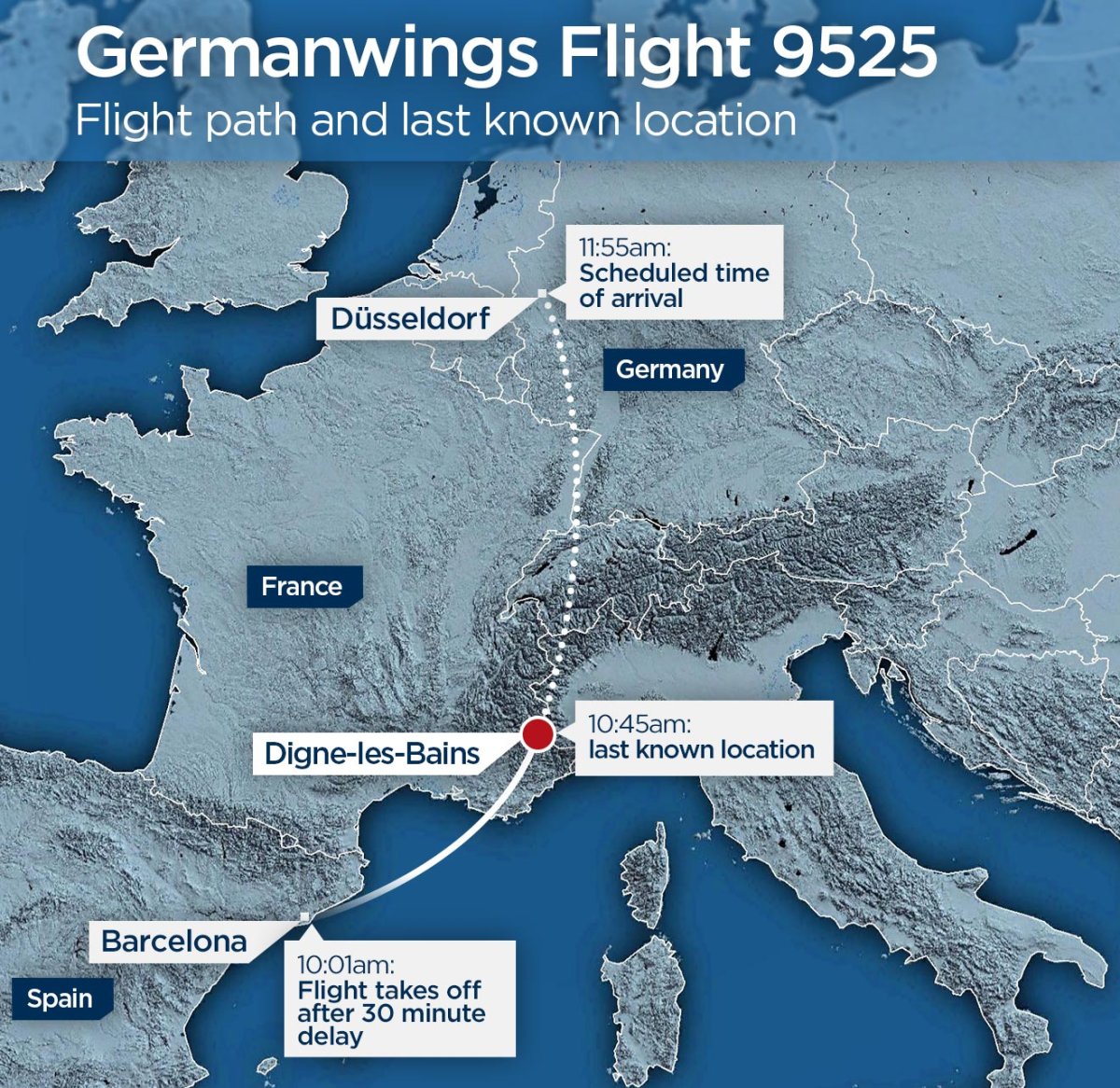LATEST UPDATES:

- Pilot in German plane crash was locked out of cockpit: report
- Investigators find one black box, searching for second
- 16 German students, 2 opera singers among victims
- 144 passengers, 6 crew members on board
- French Prime Minister Manuel Valls confirmed no survivors
- Local lawmaker says ‘everything is pulverized’ at crash site
SEYNE-LES-ALPES, France — The last communication from a doomed German jetliner was routine. The mangled black box has yielded sounds and voices, the lead investigator said Wednesday, but so far not the “slightest explanation” why the plane plunged into an Alpine mountainside, killing all 150 on board.
Midway through a flight from Barcelona to Duesseldorf on Tuesday, Germanwings Flight 9525 was chilling in its normalcy. The last communication was a routine request to continue on its route, said Remi Jouty, the head of the accident investigation bureau, or BEA.
Then minutes later, at 10:30 a.m., the Airbus A320 inexplicably began to descend. Within 10 minutes it had plunged some 32,000 feet from its cruising altitude of 38,000 feet, slamming into the remote mountainside at an altitude just above 6,000 feet, Jouty said.
READ MORE: What we know about crash victims
With no distress call or other indication of anything out of the ordinary, French investigators struggled Wednesday to solve the mystery. While alarming, the descent was still gradual enough to suggest the plane was under the control of its navigators.
“The descent is compatible with a plane controlled by pilots,” Jouty said. “It is also compatible with a plane controlled by automatic pilot.”
“At this point, there is no explanation,” he added. “One doesn’t imagine that the pilot consciously sends his plane into a mountain.”
The BEA chief said “sounds and voices” were registered on the digital audio file recovered from the first black box, retrieved six hours after the crash and delivered Wednesday to investigators. He did not divulge the contents, insisting time was needed to decipher them.
Confusion surrounded the fate of the second black box. French President Francois Hollande said the casing of the flight data recorder had been found in the scattered debris, but was missing the memory card that captures 25 hours’ worth of information on the position and condition of almost every major part in a plane. However, Jouty refused to confirm the discovery
French officials said terrorism appeared unlikely and Germany’s top security official said there was no evidence of foul play.
WATCH ABOVE: The leaders of Germany, France and Spain gathered in the French Alps on Wednesday near the site of a German budget airlines crash to pay homage to the 150 victims
As authorities struggled to unravel the puzzle, Hollande, German Chancellor Angela Merkel and Spanish Prime Minister Mariano Rajoy converged on the remote accident site to pay their respects to the dead — mostly German and Spanish citizens among at least 17 nationalities.
“This is a true tragedy, and the visit here has shown us that,” Merkel said after she and Hollande overflew the desolate craggy mountainside.
Jouty said the voice recorder, which records cockpit conversations, had yielded sounds and voices, though he refused to specify whether they belonged to the pilots or divulge what was said. He said deciphering the material was “an ongoing work” that could take days or weeks.
“There’s work of understanding voices, sounds, alarms, attribution of different voices,” the BEA chief said.
Lufthansa CEO Carsten Spohr, himself a pilot, said he found the crash of a plane flown by two experienced captains while at cruising altitude “inexplicable.” Cruise is considered the safest part of a flight, with only about 10 percent of crashes occurring at that altitude.
LIVE UPDATES:
READ MORE: Timeline of Germanwings Flight 9525 crash
“We still cannot understand what happened there yesterday,” he said. “Lufthansa has never in its history lost an aircraft in cruise flight and we cannot understand how an airplane that was in perfect technical condition, with two experienced and trained Lufthansa pilots, was involved in such a terrible accident.”
The four possible causes of any crash are human error, mechanical problems, weather, criminal activity or any combination of these. Investigators use the cockpit voice and flight data recorders to focus their work, said Alan E. Diehl, a former air safety investigator with the National Transportation Safety Board.
“Both will point you in directions of what is critical,” Diehl says. “Based on what you learn from the recorders, you might focus on key pieces of wreckage.”
“You’re usually dealing with a jigsaw puzzle with many of the pieces missing,” he said. “You start eliminating things that didn’t happen.”
The flight data recorder is important because of the critical information it provides on the plane’s altitude, speed, location and condition. But experts said the analysis can begin with the voice recordings investigators already have in hand.
“You have a moment in time and you can start linking what you hear to what you have seen happening on the radar trace,” said Joris Melkert, an aerospace engineer at Delft University of Technology in the Netherlands.
“Are these pilots fully conscious? Are they doing things? Are they just chatting? Do they recognize that something is wrong? … Do you hear the sound of alarm bells? Are there spoken messages from the aircraft that are warning something has gone wrong?”
Helicopters ferried in rescue workers and other personnel throughout the day. More than 600 rescue and security workers and aviation investigators were on site, French officials said.
READ MORE: Heartbreaking images of family and friends of Germanwings 9525 victims
Investigators will use the cockpit voice and flight data recorders to map out and focus their work, said Alan E. Diehl, a former air safety investigator with the National Transportation Safety Board.
“Both will point you in directions of what is critical,” Diehl says. “Based on what you learn from the recorders, you might focus on key pieces of wreckage.”
READ MORE: Condolences, prayers for Germanwings Flight 4U9525 crash victims
The four possible causes of any crash are human error, mechanical problems, weather, criminal activity or a combination of two or more. Diehl says investigators will essentially work backward.
“You’re usually dealing with a jigsaw puzzle with many of the pieces missing,” he says. “You start eliminating things that didn’t happen.”
Lufthansa said two charter flights to France will be made available for family members who want to get as close as they can to the crash site. Locals in Seyne-les-Alpes offered to host the bereaved families because of a shortage of rooms to rent.
Germanwings cancelled several flights Wednesday because some crews declared themselves unfit to fly after losing colleagues.
“The management completely understands this, because we are a small family. Everyone knows everybody inside Germanwings, so it is a big shock for employees,” said CEO Thomas Winkelmann.
He said the company had already contacted most families of the victims and was trying to reach the rest. He said victims included 72 German citizens, 35 Spaniards, two people each from Australia, Argentina, Iran, Venezuela and the U.S. and one person each from Britain, the Netherlands, Colombia, Mexico, Japan, Denmark, Belgium and Israel.
Some could have dual nationalities, for Spain’s government said 51 citizens had died in the crash.
READ MORE: A look at the safety record of the A320
The victims included two babies, two opera singers, an Australian mother and son vacationing together, and 16 German high school students and their two teachers returning from an exchange program in Spain.
“Nothing will be the way it was at our school anymore,” said Ulrich Wessel, the principal of Joseph Koenig High School in the German town of Haltern.
“I was asked yesterday how many students there are at the high school in Haltern, and I said 1,283 without thinking — then had to say afterward, unfortunately, 16 fewer since yesterday. And I find that so terrible,” he added.
Paul Andrew Bramley, a 28-year-old from Britain, had been studying hospitality and hotel management in Lucerne and was flying to meet his mother before starting an internship on April 1.
“He was the best son. He was my world,” said his mother, Carol Bramley.
In Spain, flags flew at half-staff on government buildings and a minute of silence was held in government offices across the country. Parliament canceled its Wednesday session.
Barcelona’s Liceu opera house held two minutes of silence at noon to honor two German opera singers — Oleg Bryjak and Maria Radner — who took the flight after performing at the theater last weekend.



Comments